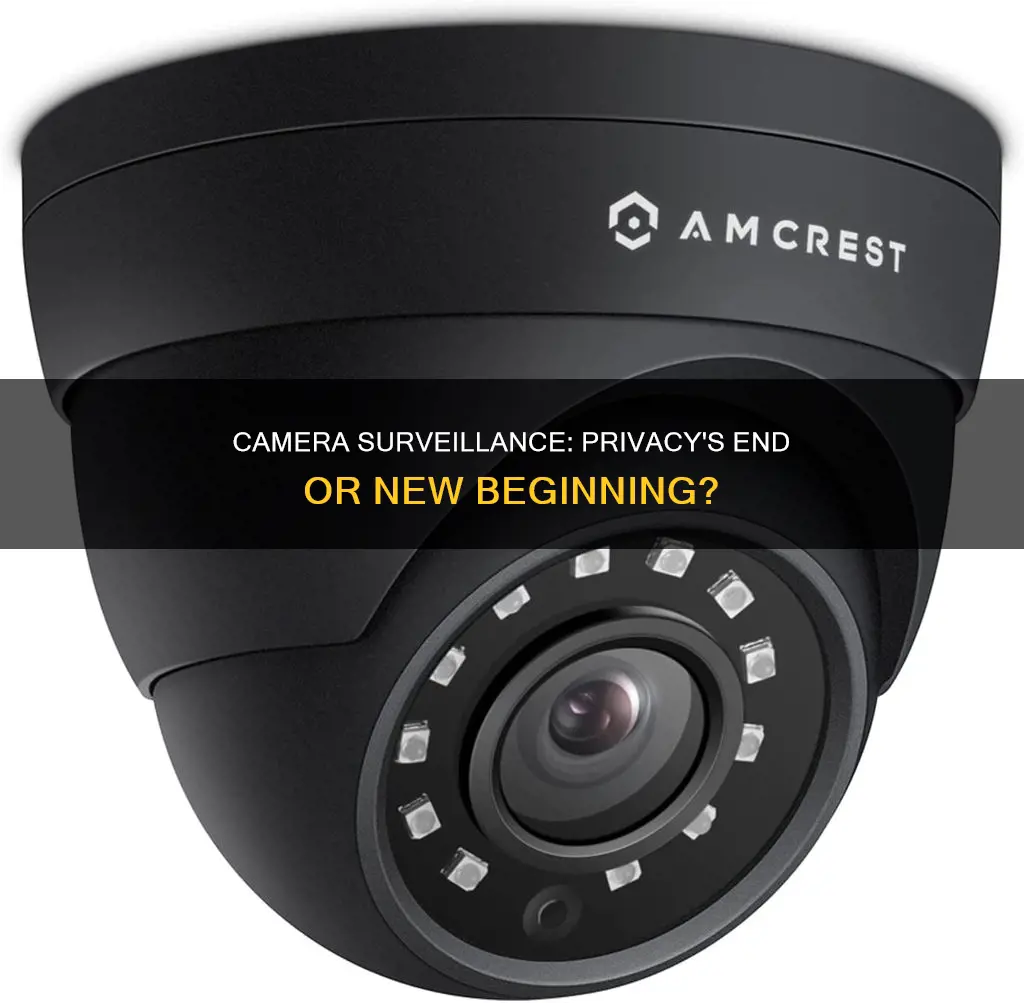
Meta's new Ray-Ban smart glasses have sparked a debate about the implications for privacy and surveillance. The glasses, which feature a built-in camera, speakers, and microphones, allow users to secretly take photos and record videos of strangers in public spaces without their knowledge or consent. While Meta has implemented a tiny LED light to indicate when the device is recording, it is easily missed, and the glasses themselves are indistinguishable from ordinary eyewear. This raises concerns about the potential for misuse and the erosion of privacy. Additionally, the broader shift towards face computers and mixed-reality headsets by companies like Meta, Apple, and Magic Leap could lead to a future with even less privacy and more distractions. The glasses also raise questions about the trade-offs between security and privacy, especially as surveillance cameras become increasingly prevalent in public spaces.
| Characteristics | Values |
|---|---|
| Name of Camera | Ray-Ban Meta Glasses |
| Company | Meta |
| Camera Price | $300 |
| Camera Features | Camera, Speakers, Microphone |
| Privacy Indicator | Tiny LED light embedded in the right frame |
| Privacy Indicator Functionality | Flashes momentarily when a photo is snapped, continuously illuminated when a video is being recorded |
| Privacy Concerns | People might not notice the privacy indicator, people might feel uncomfortable knowing they are being recorded |
| Other Concerns | Distraction, glare from headlights, lack of a killer app |
What You'll Learn
- Meta's Ray-Ban smart glasses can secretly record photos and videos of strangers without their consent
- Privacy concerns are heightened by the glasses' ability to record without others' knowledge
- The glasses' design makes it challenging for others to notice if they are being recorded
- The implications of the glasses on personal privacy and societal interactions
- The broader shift towards face computers and its potential impact on privacy and safety

Meta's Ray-Ban smart glasses can secretly record photos and videos of strangers without their consent
Meta has partnered with EssilorLuxottica to launch a new generation of Ray-Ban smart glasses, which are available for pre-order at $299. The glasses feature improved audio and cameras, and offer over 150 different custom frame and lens combinations. They are also lighter and more comfortable than their previous iteration.
The new Ray-Ban smart glasses allow users to livestream directly to Facebook or Instagram and use the “Hey Meta” voice command to engage with Meta AI. The glasses are equipped with an ultra-wide 12 MP camera that captures photos and 1080p videos up to 60 seconds in length. Users can share photos directly with friends and family via a voice command.
The glasses include a tiny LED light embedded in the right frame to indicate when the device is recording. When a photo is taken, the light flashes momentarily, and when a video is being recorded, it stays continuously illuminated. However, during a test of the device, a reporter for the New York Times shared that despite taking 200 photos and videos in public spaces, no one noticed or confronted them about the LED light.
While the smart glasses offer new capabilities and convenience, there are concerns about the implications for privacy and the potential for secret recording of strangers without their consent.
Check Your Camera Ticket Status: A Quick Guide
You may want to see also

Privacy concerns are heightened by the glasses' ability to record without others' knowledge
Privacy concerns are mounting over the ability of smart glasses to record without the knowledge of others. Smart glasses are wearable face computers that can record photos and videos, and interact with objects in the real world. Meta, Apple, and Magic Leap have all been promoting mixed-reality headsets that use cameras to enable their software to do this.
The Ray-Ban Meta glasses, for example, include a tiny LED light embedded in the right frame to indicate when the device is recording. When a photo is taken, it flashes momentarily; when a video is being recorded, it stays on continuously. However, during a test of the glasses, no one noticed the LED light, and the reviewer felt that even if they had, it would be considered rude to comment on or stare at a stranger's glasses.
A Meta spokesperson said the company took privacy seriously and had designed safety measures, including tamper-detection technology, to prevent users from covering up the LED light with tape. However, the reviewer still felt bothered by the privacy implications of the glasses.
The rise in popularity of smart glasses could further erode any sense of privacy in public settings. This concern would be compounded by the fact that the companies developing these glasses are already facing heightened scrutiny for data-handling practices following privacy breaches in recent years.
A chief concern among consumers about Google Glass, for example, was its always-on cameras and microphones that allowed users to record their surroundings without the consent of those around them. People did not like the idea of someone wearing a pair of smart glasses with a camera in it, and the perception of privacy invasion that someone could be recording them.
The covert nature of smart glasses has also raised concerns about the potential for secret recordings of conversations and the creation of deepfakes. Researchers from Cornell University warn that smart glasses can potentially create a major "power imbalance" between the haves and have-nots.
To address these concerns, some have suggested that smart glasses designers add a projection display and a recording indicator light to make it clear to everyone nearby what the wearer is seeing and recording.
The Craft of Camera Bag Making
You may want to see also

The glasses' design makes it challenging for others to notice if they are being recorded
The glasses design makes it challenging for others to notice if they are being recorded. The $300 Ray-Ban Meta glasses, which were recently released, include a tiny LED light embedded in the right frame to indicate when the device is recording. When a photo is taken, the light flashes momentarily, and when a video is being recorded, the light stays on continuously. However, during a test of the glasses, no one noticed the LED light, and the reviewer felt that it would be rude to comment on or stare at a stranger's glasses.
Meta has stated that they take privacy seriously and have designed safety measures to prevent users from covering up the LED light with tape. Despite these measures, the glasses raise concerns about the impact of such technology on our privacy and ability to focus. The reviewer, for instance, felt constantly distracted while wearing the glasses, even when not using any of the features.
The glasses' design and small size make them less noticeable than a smartphone, which could make it easier for people to secretly record others without their knowledge or consent. This could have significant implications for privacy and raise ethical concerns about the use of such technology.
Focusing Your Galaxy S9: Tips and Tricks
You may want to see also

The implications of the glasses on personal privacy and societal interactions
One of the main concerns is the potential for secret recording and surveillance. The glasses include a camera that can be used to take photos and videos discreetly, without the knowledge or consent of the people being recorded. This raises serious privacy concerns, especially since the glasses are challenging to distinguish from ordinary eyewear. While Meta has included a small LED light to indicate when the device is recording, it is easy to overlook, and individuals may not feel comfortable confronting a stranger about it. This lack of awareness and control over one's privacy can be unsettling and may lead to a sense of unease in public spaces.
Additionally, the always-on nature of the glasses may impact our ability to focus and be present in the moment. Even when not actively using the device, there is a constant preoccupation with the possibility of capturing photos or videos. This mental distraction can interfere with everyday tasks, such as driving or working, and may detract from fully engaging with the people and activities around us.
The glasses also raise questions about the role of technology in mediating our interactions with the world. While the glasses offer a hands-free way to capture and share experiences, they may also create a sense of detachment or remove us further from direct engagement with our surroundings. There is a risk that we become more focused on documenting and sharing our lives through technology rather than fully immersing ourselves in the present moment.
Furthermore, the integration of artificial intelligence (AI) in the glasses raises additional concerns. AI-powered features, such as object recognition and scanning, contribute to a growing sense of unease about the potential misuse of personal data. The collection and analysis of visual data by tech companies could have far-reaching implications for privacy and data protection.
Lastly, the glasses have the potential to impact social interactions and dynamics. The presence of recording devices, even if they are not actively recording, may influence people's behaviour and inhibit natural, spontaneous interactions. There is also a risk that the glasses could be used to target or discriminate against certain individuals or groups, exacerbating existing social tensions and inequalities.
In conclusion, while the glasses offer new possibilities for connectivity and convenience, they also present significant implications for personal privacy and societal interactions. It is essential to carefully consider and address these concerns to ensure that the benefits of the technology do not come at the cost of our privacy, social connections, and overall well-being.
Reviving Dionic Camera Batteries: Charging Tips and Tricks
You may want to see also

The broader shift towards face computers and its potential impact on privacy and safety
The shift towards face computers is well underway, with companies like Meta, Apple, and Magic Leap hyping their mixed-reality headsets and face computers. These devices have cameras that enable various functions, such as object recognition and surveillance. While these technologies offer exciting possibilities, they also raise concerns about privacy and safety.
One of the primary concerns is the potential invasion of privacy. Face computers with cameras can be used to secretly take photos and record videos of people in public places without their consent. This was demonstrated by a reporter for the New York Times, who used Meta's Ray-Ban glasses to record strangers in parks, on trains, and inside stores. While these glasses feature an LED light to indicate recording, it was reported that no one noticed or confronted the reporter. This incident highlights the potential for covert surveillance and the challenges of ensuring privacy in public spaces.
Another concern is the accuracy of face recognition technology. There have been multiple studies showing that facial recognition is less accurate when identifying people of color, particularly black women. This inaccuracy can lead to misidentification and potentially wrongful convictions. The lack of federal regulations around this technology further exacerbates these concerns. While some cities and states have implemented restrictions on the use of facial recognition by law enforcement, there is a need for more comprehensive legislation to protect citizens' rights.
In addition to privacy and accuracy concerns, there are also worries about the potential for abuse by law enforcement and government entities. Facial recognition technology can be used for constant surveillance of the public, as seen in China, where it is used to arrest people for petty crimes. Without proper checks and balances, this technology could be misused to violate basic civil rights and privacy.
Furthermore, face computers may impact our ability to focus and be present in the moment. The reporter from the New York Times mentioned feeling constantly distracted while wearing the glasses, even when not actively using any of the features. This distraction could have safety implications, especially when driving or operating machinery.
Lastly, there are security concerns related to face computers. If a camera with facial recognition capabilities is hacked, a malicious actor could gain access to sensitive information about individuals. Additionally, there are questions about where the captured facial data is stored and how it is protected.
While face computers offer exciting possibilities for innovation and convenience, it is crucial to address these privacy and safety concerns. Responsible development and use of this technology are essential to ensure that the benefits outweigh the potential risks to society.
Unleashing Adobe Camera Raw: A Beginner's Guide
You may want to see also
Frequently asked questions
Meta has released a pair of $300 Ray-Ban smart glasses that include a camera, speakers, and microphones.
The glasses allow users to secretly snap photos and record videos of strangers in public places without their consent. This raises concerns about privacy and surveillance.
The glasses have a tiny LED light embedded in the right frame that flashes when a photo is taken and stays illuminated when recording a video. Meta claims that this feature informs people that they are being photographed or recorded.
Meta states that the glasses can help users "live in the moment" while sharing their experiences with the world. For example, users can livestream a concert on Instagram while watching the performance, instead of holding up their phone.
Some people are concerned about the privacy implications of the glasses, feeling that they herald a new age of surveillance. Others are skeptical about Meta's claim that the glasses help users "live in the moment," arguing that having a camera with you takes you out of the present moment as you become focused on capturing photos and videos.







